The Ballad of Saint Zita
I.
O Light of lights, Redeemer of mankind,
Whose glory most in mercy shines displayed,
Concede Thy favour to my humble mind,
Increase my feeble memory with Thine aid,
My heart to-day some fitting words would find,
To tell of Zita, Lucca's holy maid:
That Christians all may read her life, and how
She sleeps in old San Frediano now.
III.
So listen kindly, friends, and I will tell,
The story of our saint, now raised so high:
And first I pray you to remember well
Her birthplace . . . To our city it lies nigh.
She who doth in the eternal glory dwell,
With other virgin saints above the sky,
Was born, long since, in Lucca's happy state,
At Monsagrato, so old books relate.
IV.
'Twas in the year twelve hundred and eighteen
This noble flower blossomed first on earth:
And in a poor man's household was she seen,
A household poor in gold, but rich in worth.
Her elder sister led a life serene
Within a convent, ere Saint Zita's birth.
Giovan Lombardo was the father styled,
A worthy parent of a saintly child.
V.
Her mother was so good, that every day
She loved her better, seeing how she grew
In fear of God, and walking in His way
From earliest childhood, with devotion true.
Prayer was her great delight, she loved to stay
In church alone, and dream of all she knew
Of how God lived on earth, and how He died;
Until her heart could hold no dream beside.
VII.
Time passed, the girl grew older, well content
To do God's work, whate'er that work might be.
Her brightest hours on her knees were spent,
And little thought of worldly things had she.
One day to saddening care her mind was lent:
'I eat my father's bread, he works for me!'
She raised her heart in prayer: 'O Lord', she said,
'To Lucca let me go, and earn my bread'.
VIII.
And He who hears in secret, heard that prayer:
For both her parents came, the selfsame day,
And asked her, 'Daughter, would'st thou now prepare
As servant in a noble house to stay?
For since to serve the Lord is all thy care,
In Lucca hath He marked thee out thy way.
There may'st thou live, there labour and there die'.
'Thank God! So be it!' Zita made reply.
IX.
They reached the house for Zita's home designed,
And Casa Fantinelli was its name.
A family of noble life and mind
Dwelt in it, when the saintly maiden came.
Just to their servants, - to the needy, kind.
With them her life could pass, almost the same
As with her parents. She, rejoiced indeed,
Gave thanks to God who did such grace concede.
XI
At twelve years old she did to service go,
And ever after in that house she stayed,
With love unwearied, which no change could know:
Her master's word she never disobeyed.
A humble mind her very looks might show,
So poor was all the dress of this poor maid!
The meanest garment pleased her best to wear,
And all the whole year round her feet were bare.
XII.
Her master and her mistress orders gave,
That Zita should in all things have her way;
Left all in Zita's hand to spend or save,
And told her, 'Do for us as best you may!'
And she, with care, and with attention grave,
Gave heed that nought were lost or thrown away;
But many things which wasted were before,
She gathered up, and gave them to the poor.
XIII.
The noble family with whom she dwelt,
Did many garments give for Zita's wear:
For all within the house great kindness felt
For her who served them with such loving care.
She thanked them humbly, yet her heart would melt,
For longing with the poor such gifts to share.
And as she could, in secret, day by day,
For love of God she gave the best away.
XIV.
And often through the country far she sought,
If any sick in lonely cottage pined;
She helped them in their need, and to them brought
Of her own food, the best her hand could find:
And clothed them with her garments, caring nought
For cold or hunger, but with willing mind
Gave all, and did her chiefest pleasure take,
In toil and harship for the dear Lord's sake.
XVIII.
But on the table what did she behold?
The loaves all there, a cloth above them laid.
At sight of which was Zita much consoled,
Not doubting but her mistress had them made:
But no, the house was silent; young and old
Had slept, while Zita in the church delayed.
She could but thank her Lord, with heart content,
Who by His angels had this favour sent.
XIX.
One fest, 'twas the day when Christ was born,
When most in church all Christians love to meet;
An ice-cold wind, that freezing winter morn,
Made all men go with heads down, in the street.
When Zita, with her garment poor and worn,
But heart all glowing with devotion sweet,
Set out for matins ere the break of day,
Her master called her back, and bade her stay.
XX.
Full sad she was to lose the morning prayer,
On Christmas day of all days, and did so
Entreat her master, though the snow-filled air
Was piercing cold. At length he let her go.
But taking off the cloak himself did wear,
He did it kindly on her shoulder throw.
'Wear this', he said, 'what time thou wilt remain
In church, but bring it safe to me again'.
XXI.
She thanked her master, and with heart content,
Set off for church amid the driving storm;
With soul uplifted, praying as she went;
And in these words her prayer at length took form.
'O Lord, behold the cloak my master lent;
Too fine it is for me, too soft and warm;
Forgive me if I wear it on the night
When Thou didst leave Thy glory and They light.
XXII.
'The night when Thou was born on earth so poor,
To give us peace; but, Lord, 'tis not my will,
Thou knowest I would willingly endure
More than this cold, Thy pleasure to fulfil!
So help me, keep me in Thy love secure!'
Just then the church she entered, praying still,
And by the door a beggar, weak and old,
In scanty garments stood, healf dead with cold.
XXIII.
She looked awhile, her heart with pity led,
Then called him, saying, 'Brother, come to me'
Come, take this cloak, and wear it in my stead;
It is not mine, or I would give it thee.
Then kneel beside me till the prayers be said;
Pray with me, and God's love shall with us be.
Then matins over, I would much desire
To lead thee home and warm thee by our fire'.
XXIV.
She said no more; her gown was old and thin,
Her feet were bare, but little did she heed:
And, praying fervently, did soon being
To feel her heart and spirit warm indeed
For thinking how, when we were lost in sin,
The Lord Himself had pity on our need,
And how for us, on just so cold a day,
Himself on earth, a new-born infant lay.
XXV.
Till, matins over and the mass as well,
As home from church the people turned once more,
She sought the beggar, but it now befell
The sacristan made haste to shut the door.
She waited, but he came not, strange to tell!
She sought him, as she never sought before;
For she would lead him to her fire, and then
Would give her master back his cloak again.
XXVI.
The church was closed, she had not seen him pass,
She searched the street in trouble and dismay:
'No doubt while I was waiting at the Mass,
Some one who saw me' (thus did Zita say)
'Went home and told my master, and, alas!
He sent in haste and took the cloak away.
The beggar must have suffered much, and now
Has gone home cold and frightened, who knows how.
XXVII.
Then said she (while new terror filled her breast),
'O Lord, I pray Thee do not me forsake!
Perhaps 'tis lost, and all must be confessed,
And I shall have but poor excuse to make.
Oh, help me! I can have nor peace nor rest
Until I find, and to my master take,
The cloak which, wrongly, I the beggar lent!'
Thus saying, heavy-hearted, home she went.
XXVIII.
But just as Zita, trembling, passed the door,
Her master met her, and with searching eye
He looked to see if still the cloak she wore:
'Twas gone! at which his anger rose so high,
With bitter words he did his rage outpour,
And sharp reproof, while she made no reply.
But while in loud and angry bvoice he spoke,
Behold appear the beggar with the cloak!
XXIX.
Who thanking Zita kindly, as he might,
Gave back the cloak like one in haste to go-
His face all changed, and shone with heavenly light,
And lighted hers, with its reflected glow.
They tried to speak, but he had passed from sight.
No beggar he, of those that walk below!
Great comfort he left their hearts within,
An angel of the Lord had with them been!
XXXIX
That very hour in which her spirit fled,
Young children through the town began to say
(Before they heard), 'The blessed Zita's dead!'
And crowd about the house wherein she lay.
A star appeared, and did much radiance shed,
O'er Casa Fantinelli at mid-day;
Which was to all a clear and certain sign
Her soul had joined the company divine.
XL.
But hardly could they bear her to her grave,
The crowd of mourning people was so great;
Some thronged her chamber, one more look to crave,
While others did in San Frediano wait,
To kiss her hand, or some memorial save,
Their sorrow to console or consecrate.
Her very garments in the press were torn
That each might have some fragment she had worn.
XLIII
And now to end my tale, I must relate,
'Twas April on the twenty-seventh day,
And in the year twelve hundred eighty-eight,
That she from earth to heaven was borne away.
Which day returning, still we celebrate;
And let each faithful soul due honour pay
To her whose life has made the way so plain,
The blessed country of our hope to gain.







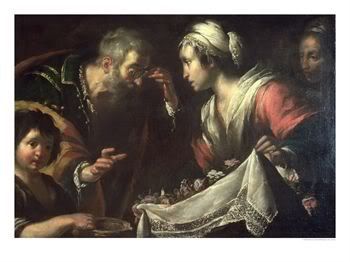
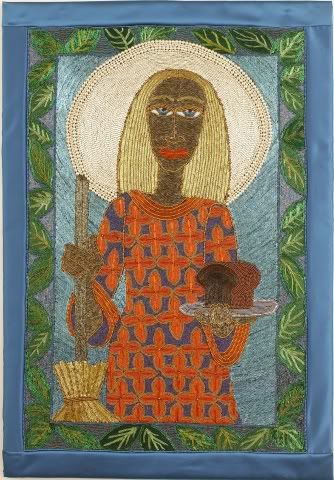
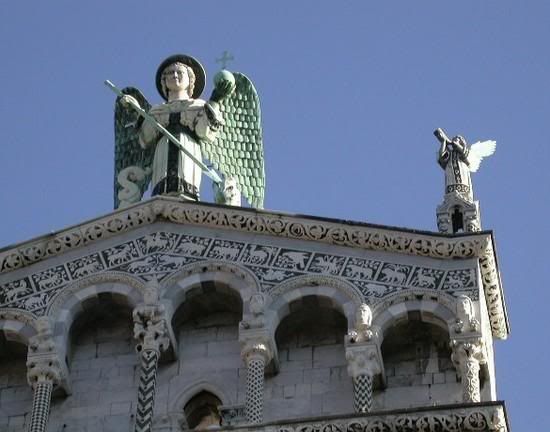
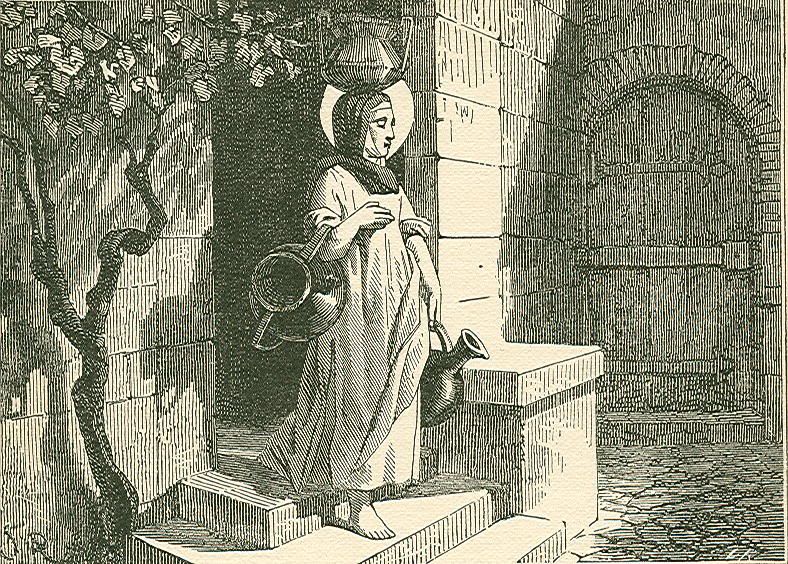
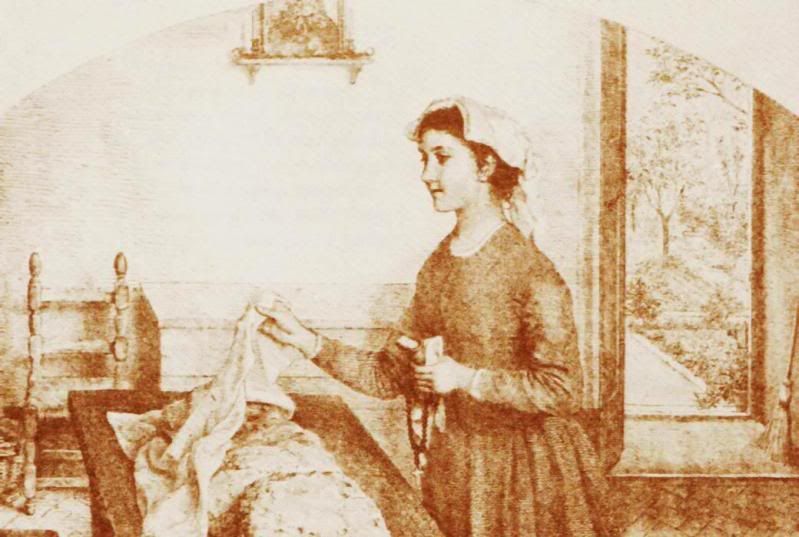
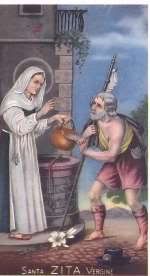
0 comments:
Post a Comment
Thanks for leaving a comment. If you wish to submit a prayer request, however, please do so above, using the "Contact" tab.